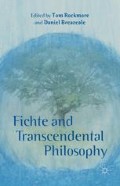Abstract
Recent as well as traditional discussions of Fichte’s view of mental acts have been mostly devoted to his doctrine of intellectual intuition. This is understandable because it occupies a central position in Fichte’s theory.1 However, a proper understanding of Fichte’s notion of abstraction is equally indispensable for grasping the full extent and import of his theory not only because it contrasts sharply with intellectual intuition but also because it reveals an important set of beliefs that underlie Fichte’s theory. These beliefs concern none other than a precise understanding of the particular role played by abstraction within the context of Fichte’s system of the I, and this is absolutely necessary for conducting a philosophical inquiry into the nature of the I properly. Further, despite the obvious dissimilarities, there are some remarkable “symbiotic” relations between abstraction and intellectual intuition.
Access this chapter
Tax calculation will be finalised at checkout
Purchases are for personal use only
Preview
Unable to display preview. Download preview PDF.
Notes
See, for example, Jürgen Stolzenberg, Fichte’s Begriff der intellektuellen Anschauung: Die Entwicklung in den Wissenschaftslehre von 1793/94 bis 1801/02 (Stuttgart: Klett-Cotta, 1986).
Antoine Arnauld and Pierre Nicole, Logic, or the Art of Thinking, ed. Jill Van Buroker (New York: Cambridge University Press, 1998). As is well known, this is an important issue for Locke, who seems to think that abstraction means generalization. Kant discusses abstraction in the sense of (mental) separation in his Logic Lectures. It was Thomas Reid, however, who first clearly proposed that abstraction in this sense does not necessarily imply generalization.
David Hume, A Treatise of Human Nature, ed. P. H. Nidditch (Oxford: Oxford University Press 1978), bk. I, part IV, section V
Thomas M. Seebohm, “Fichte’s Discovery of Dialectical Method,” in Fichte Historical Contexts / Contemporary Perspectives, ed. D. Breazeale and T. Rockmore (Atlantic Heights, NJ: Humanity Books, 1994), 25.
For a discussion of tropes, see David M. Armstrong, Universals: An Opinionated Introduction (Boulder, CO: Westview Press, 1989), 16. See also his Universals and Scientific Realism (New York: Cambridge University Press, 1978), vol. 1, 28–43.
For a particularist interpretation of Fichte, see Frederick Beiser, German Idealism (Cambridge, MA: Harvard University Press, 1999), 283–284.
George J. Seidel, Fichte’s Wissenschaftslehre of 1794: A Commentary on Part I (West Lafayette, IN: Purdue University Press, 1993), 109.
John Sallis also suggests that Fichte’s notion of reflection can be divided into two sorts: viz., the reflection (of the system of the human spirit) in consciousness or knowledge and the reflection back upon oneself. See Sallis, Spacings — of Reason and Imagination in Fexts of Kant, Fichte, Hegel (Chicago: University of Chicago Press, 1987), 47–48.
Editor information
Editors and Affiliations
Copyright information
© 2014 Halla Kim
About this chapter
Cite this chapter
Kim, H. (2014). Abstraction in Fichte. In: Rockmore, T., Breazeale, D. (eds) Fichte and Transcendental Philosophy. Palgrave Macmillan, London. https://doi.org/10.1057/9781137412232_10
Download citation
DOI: https://doi.org/10.1057/9781137412232_10
Publisher Name: Palgrave Macmillan, London
Print ISBN: 978-1-349-48949-7
Online ISBN: 978-1-137-41223-2
eBook Packages: Palgrave Religion & Philosophy CollectionPhilosophy and Religion (R0)

